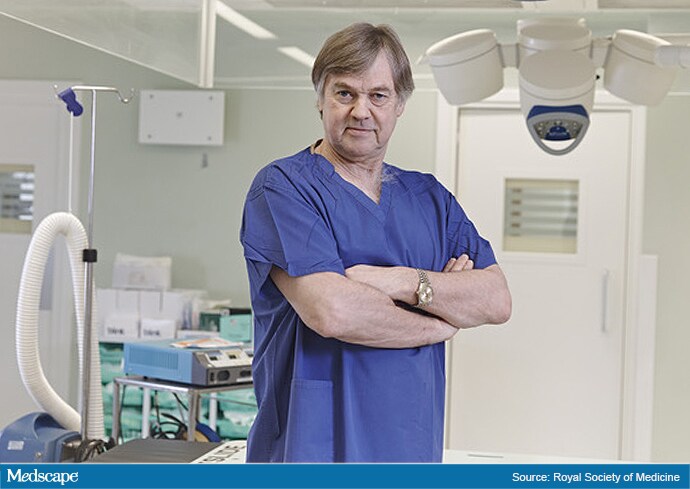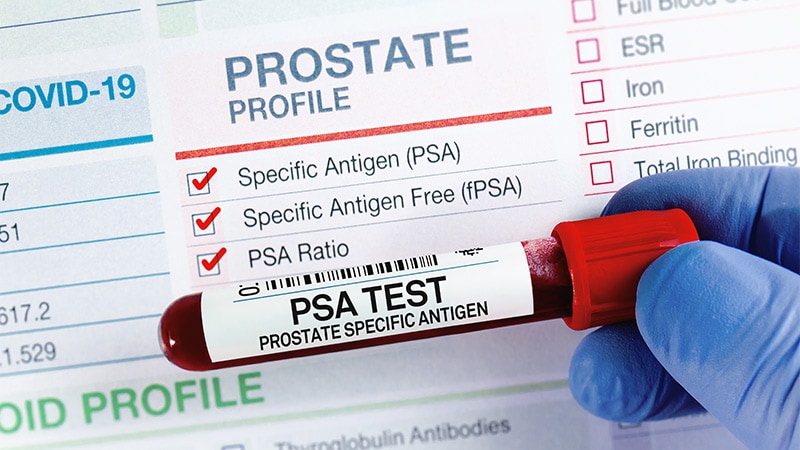World-renowned urologist Professor Roger Kirby has recently been named the Royal Society of Medicine president-elect.
He takes up his new post in October and will succeed Professor Sir Simon Wessely as president in July 2020.
Professor Kirby is a prostate surgeon with more than 40 years of experience, both in the NHS and private practice.
He was one of the first urologists in the UK to perform open radical prostatectomy for localised prostate cancers and was instrumental in founding two UK charities: Prostate Research Campaign (now Prostate Cancer UK), and The British Urological Foundation, (now The Urology Foundation, or TUF).
In 2012, Professor Kirby was himself diagnosed with prostate cancer.
Medscape UK spoke to Professor Kirby about his new role, the treatment of prostate cancer, and his own experience.

Q&A
What are your priorities for the RSM when it comes to medical education in this time of transformative technological and digital change?
The Royal Society of Medicine is a very ancient and learned institution, founded in 1805. It has a particularly wonderful location at number 1 Wimpole Street with 25,000 sq ft of space. But it really does need to be modernised – in a way that doesn't antagonise or disrupt our very loyal membership.
We have 22,000 members, many very senior doctors who will want the heritage of the organisation preserved. But things are changing in the world and in medical education so we need to change with it, and be a bit more modern in the way we provide and deliver medical education. We also need to use our fantastic floor space a little more imaginatively.
What I'd like to do is provide more support for younger doctors through the RSM. Many trainees are feeling rather disillusioned and burnt out at the moment. Currently there's a recruitment and retention crisis in the NHS, and one of the reasons for that is that young doctors no longer feel supported in the way I did through the 'firm' structure which made sure doctors felt valued throughout their training in the NHS. I do think the demands on junior doctors are far greater now: for example there's much more medical knowledge out there and they have a huge amount of information that they have to assimilate during their training. The modernising of medical careers (MMC) reorganisation in 2005 basically took apart the traditional “firm” structure and replaced it with a rather frenetic training rotation from hospital to hospital. Now trainee doctors no longer stay long enough in one hospital to develop loyalty to that institution. As a result trainees no longer receive the pastoral care which I was nurtured by, and which I hope I used to give. Perhaps the RSM can help to fill this deficiency.
In terms of education, one can provide amazing education and training remotely and create interactive learning programmes so we need to move away from lecture-based education. Doctors no longer want to come and sit passively and listen to hours of lectures and then ask a few questions at the end. They prefer more interactive learning and we need to embrace and provide this.
I believe that the RSM ought to be a hub for junior doctors to get together to socialise, to innovate and support each other. The RSM could provide that facility: something along the lines of Soho House, a members’ club for the creative industries which is packed with young people, all with their laptops out and thinking about and planning innovative projects. Really the RSM should be a place where young doctors congregate and interact in a positive way. We need to change the environment so that it becomes more enticing to younger clinicians. At the moment it's a bit old fashioned, so we need to change our image to make it a “go to” place, but without alienating our loyal and much-appreciated senior membership.
You have been instrumental in raising the profile of prostate cancer in the UK. Is there more to do? Is funding adequate for prostate cancer when compared to, for example, breast cancer?
There's still a gap between the knowledge women have about breast cancer compared with the knowledge that men have about prostate cancer. This lack of awareness means that men are still being diagnosed with late-stage prostate cancer, so we have a lot of work to do.
Charities have done a great job in raising awareness, as well as much needed funds for research and education, as have celebrities such as Stephen Fry, who came to speak at the RSM recently; but there's still more to do. Prostate cancer, if you catch it early as in my case, can be completely cured. If you diagnose it late, although people can still survive for many years, their quality of life is wrecked by a combination of treatment side-effects and disease progression. By contrast, if you diagnose it early you can eradicate the disease so that patients can lead a pretty normal life.
What was the impact of being diagnosed with prostate cancer yourself in 2012?
I really think that it made me a better and more sympathetic doctor. People ask me if I became terribly emotional about it: I don’t think I did really, I just “took it on the chin”, had the operation and got cured. It was annoying having to take time off work, and I felt fatigued for a few months. It did reinforce my view that prostate cancer is a disease which needs to be better researched, caught earlier and better treated. When you get a disease you tend to think: is there something you could have done differently to prevent it? Actually, there's some convincing evidence that too much red meat, especially preserved meats, can increase the risk of both prostate and breast cancer. That does make you wonder whether you could have avoided developing prostate cancer by having a diet with less red meat and animal fat.
NICE guidelines earlier this year suggested that active surveillance for men with low-risk prostate cancer should now be considered as an equal choice alongside prostatectomy and radiotherapy. Do you think some men wouldn't be happy with the wait and see approach?
I do think that's right. We are now much better at sub-categorising patients in terms of risk of disease progression. It's not just PSA score and biopsy results - we now have sophisticated MRI technology as well as new genetic markers which can differentiate those cancers that are likely to be aggressive from those that are non-aggressive and unlikely to progress. Active surveillance works well in at least half, maybe two-thirds of patients, who never need active treatment such as surgery or radiotherapy. Admittedly, it can cause some psychological issues as some men don't like to be advised to do nothing after being diagnosed with prostate cancer. However, if the situation is explained carefully and sympathetically, they do see the logic in active surveillance as a practical management option.
Men over 50 in the US are much more likely to know their own PSA score, and keep tabs on it, than men in the UK. Do you think British men should be more aware?
I certainly think men could be more aware of the risk of prostate cancer in general. PSA is not a perfect marker. The test has been around since the 1970s, so not surprisingly it is far from perfect as a discriminator between cancer and benign enlargement of the prostate. However it does give you an indication that there's something abnormal going on within the prostate. It certainly gave me the clue that I had a significant problem. My PSA is now undetectable and that's how I know I'm cured. PSA is useful, but ideally you'd want a marker that is better than PSA, as well as a way of preventing prostate cancer, and new ways of treating it which cause less in the way of side-effects.
So far in your career, what are you most proud of?
I've loved being a surgeon and championing innovation. For example, learning how to use the da Vinci robot for prostate surgery really improved the quality of care that I was able to offer my patients.
I'm proud of my charitable work, fundraising and helping to found two major charities. I am vice-president of Prostate Cancer UK and president of The Urology Foundation (TUF). TUF provides support and training for urologists who deal not just with prostate cancer but with bladder, kidney and testicular cancer as well as many other urological problems.
I'm also very proud of being elected president of the RSM. I do hope that through this organisation, over the 3 years of my presidency I can help to support the medical profession, especially our fantastic trainees, and through them help their patients.
It's now exactly 50 years since I embarked on my medical training at St John’s College Cambridge. I've had such a fascinating career, and I believe my role now at the RSM is to try to make sure that doctors younger than I have an equally productive and fulfilling time in medicine.



